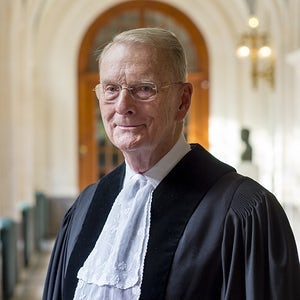Chair of the Board of Trustees Harriet Miers; President T. L. Cubbage; Ambassador Jordan; other Trustees and Officers of the Center; and all of the magnificent Staff of the Center, not a single one of whom has ever disappointed me in the three decades and more that I have been active in this organization:
I choose to express the gratitude and humility with which I receive and accept this award in the elegant terms in which George Washington wrote to “The Hebrew Congregations in the Cities of Philadelphia, New York, Charleston, and Richmond” when replying to their letter of December 19, 1790, congratulating him on his election as President:
". . . [T]he repeated proofs which my follow-citizens have given of their attachment to me, and approbation of my doings, from the purest source of temporal felicity.
The affectionate expressions of your address again excite my gratitude and receive my warmest acknowledgements.
And as my exertions have hitherto been amply rewarded by the approbation of my follow-citizens, I shall endeavor to deserve a continuance of it by my future conduct."1George Washington, “To the Hebrew Congregations of Philadelphia, New York, Charleston, and Richmond,” Dec. 13, 1790, available at https://founders.archives.gov/documents/Washington/05-07-02-0036.1
I would like to recite a few words that always have guided me to this moment and that I believe also must resonate with all of you.
The March 15, 1832, issue of Springfield, Illinois’s “Sangamo Journal” carried a notice by a barely 23-year-old Abraham Lincoln announcing his candidacy for the State Legislature, in which he wrote the following:
"Every man is said to have his peculiar ambition. Whether it be true or not, I can say for one that I have no other so great as that of being truly esteemed of my fellow men, by rendering myself worth of their esteem."2Abraham Lincoln, First Political Announcement, Sangamo J., March 9, 1832, available at http://www.abrahamlincolnonline.org/lincoln/speeches/1832.htm.2
The final word I leave with you is this. On Valentine’s Day in 2011, I attended the noon service in the Anglican Cathedral in Christchurch, New Zealand. When walking around inside the cathedral following the service, I spotted on an engraved plaque this verse from the Bible, the Book of Micah, Chapter 6, Verse 8, which summarizes why all of us in the law do what we do:
"And what does the Lord require of you but to do justice, and to love mercy, and walk humbly with your God?"3Micah 12:19.3
Amen and thank you again.

